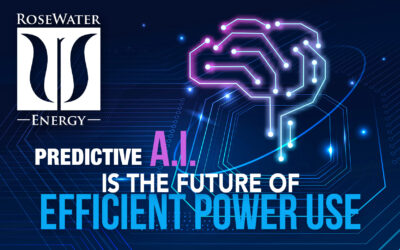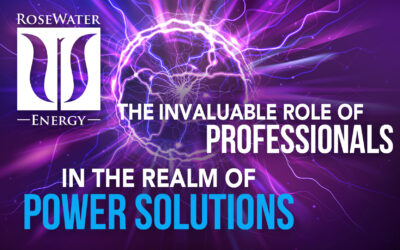In this episode of Pro AV Today, host Ben Thomas continues his conversation with Joe Piccirilli about the integration side of things in the AV industry. They discuss the role of electricians and integrators, as well as the concept of energy integration in residential and commercial applications.
Piccirilli explains that in the past, energy came solely from the utility, but now there are multiple sources such as renewables, generators, and battery backups. However, these different disciplines have been siloed, and there is a need for someone to coordinate and optimize energy inputs. Piccirilli suggests that custom integrators in the residential world could fill this role by expanding their knowledge.
They also discuss the importance of power reliability and the impact of power outages on residential and commercial settings. Additionally, they touch on the value of hiring professionals for AV installations and the potential role of AI and automation in power management and home automation.
Transcript
Ben Thomas:
Hey, everybody. Welcome back to Pro AV Today. Excited to continue a conversation that I had with my next guest, Joe Piccirilli, that we had on his show. Thought that we were having such a good conversation that we would bring it over to Pro AV Today, but talk a little bit more about the integration side of things. And talk about the electrician and even this new idea of what I would call an electrical integrator, an energy integrator, especially when you look at residential and commercial applications.
So Joe, we’re excited to have you back on. Welcome back to the show, and looking forward to having a good conversation with you today.
Joe Piccirilli:
Ben, thank you for inviting me onto your show. We had such a good conversation last time. I’m really looking forward to see what direction we’ll take this one. This is great.
Ben Thomas:
Well, look, I think that’s a good place for us to start, is I want to ask you about this idea. So one of the things that you and I had a chance to talk about after the show last time was the role of the electrician, the integrator, and how they are at times warring against each other. And it’s unrealistic to ask the integrator to be a specialist on solar power or power backups or things like that, because their primary role is for AV installations. There is some crossover there obviously. But one of the things you brought up as part of that conversation was the idea of what I would call energy integration.
And I think that’s a good place for us to start because a lot of times, especially in the installations, we’re talking about, we’re talking about higher level residential installations, even commercial installations in many cases, there is already a decision that’s been made to hire an integrator and installer of some sort. That decision has already been made. But I wanted to ask, you talked to me a little bit about that energy integration world. I want to ask, what does that look like to you? And obviously it’s still not a perfect world or even a full reality yet, but what could something like that look like?
Joe Piccirilli:
Well, it’s interesting. I want to go back a bit because remember, three decades ago, all energy came from the utility. And we were all extremely confident that the utility could meet all of our needs and there was no need to have someone to coordinate energy input. Now, fast-forward and we have a number of input sources. Because you still have the utility, somewhat less reliable thanks to population gains and the demand for quality power. Then we have renewables, which are interesting. It’s getting power from the sun, it feels good. There are drawbacks. A cloud goes by and it’s limited, and how do you calculate how much solar you can actually get where you are?
Then of course, there is the old-fashioned generator where you have one at your house. There are people who are very opposed to generators because they use fossil fuels, God forbid, but it is an input. And then there’s large scale battery backup in another thing, and then there’s power conditioning. And all of those disciplines, to this day, has been siloed. There is the electrician who is on the utility side who sometimes sells a generator. Then there are battery backup people, and then there are renewable energy people, and then there are power conditioning people, and we’re all siloed. We don’t talk to one another. And in many times, we’re at cross purposes because of self-interest.
So how does a person building a facility, either commercial or a luxury residential, how do you get the honest broker? How do you get them to work in synergy so that you are getting optimal performance for any input you use? And that, today, I think is a role that needs to be filled. And I am partial because of my background that it will be filled by what we call today, custom integrators in the residential world, that are going to have to expand their pallet of knowledge. But that’s really what I’m talking about is, is there a person today? No. There are a few of us. I’m one of those people, I spend a lot of time doing it. But we need a cadre of people. It’s not, you can’t have me. I’m not scalable.
Ben Thomas:
Well, and you see that. Look, we were both at SEDA. You see conversations happening like that, and it is different year-over-year. I mean there’s the conversation dujour that happens every year, but one of the things that seems to stick around is the idea of whether it’s renewables, whether it’s a whole home backup system, whether it’s generators. Power is the conversation that consistently happens at residential-minded shows. And we talked about this on your show last time too. I’m very partial to this conversation because in Texas where I live, it was a couple of years ago, we lost power for over a week where I live. And yes, it’s inconvenient to have your wifi and your AV systems go down, but you start talking about power and then you’re losing critical resources. You’re talking about home heating, you’re talking about cooling, cooking, things like that. So it’s an important conversation for us to have.
But I do want to focus a little bit more on the AV side for our conversation today. And I want to ask, so set the table just a little bit. So we’ve got all these new cool technologies. Everything from your traditional home theater systems, your two wire systems, all that good stuff, to whole home automation, HVAC, all sorts of different things. How has the power consumption evolved? Are we looking at just massive increases of demand or do we have a little bit more energy efficiency on the technology level? What does that world look like for us?
Joe Piccirilli:
That’s a terrific question. I’m going to start in lighting, because lighting was a hot topic for a long time. It still is. And you think about, we used to use incandescent bulbs. And 100 watt bulb was 100 watts of draw. Today, thank goodness, when we switched to LED, you can get that same level of brightness with four watts of consumption. So all of a sudden in the world of lighting, which was a huge draw, that has become significantly less. And I mean, like 80% less, a lot. So there is hope there, but what has happened is now LED bulbs … and because of their very nature, you can actually control color, temperature. And when you put a microprocessor on an LED bulb, you can do lots of cool things. But LED bulbs are very, very sensitive to power sags.
So when all of a sudden, in a storm in particular, or … in Texas, you’re used to this. When every air conditioner in the state in July is on, the voltage drops. There’s no two ways about it. And LED bulbs are particularly susceptible to those kinds of things. So the longevity is decreased. You were talking about control systems. Now a lot of residences, particularly luxury residential, have full-out control systems for everything. Lighting, shades, HVAC. Everything in the house that … now, even plumbing, actually. Everything that can be controlled, is being controlled. Well, if that control system backbone goes down, then none of that works. And even a minor interruption there becomes painful because you have to reboot everything.
Now, we were talking offline earlier, in the commercial world, it’s really easy to monetize those things. Because if you’re down for 12 hours or 10 hours or an hour, you know how much revenue you’ve lost, because you take in so much an hour. But in the residential world, it is really interesting. It’s a loss of time. And I consider time the single most precious commodity that any human has, because we don’t know how much of it we have. And if you look at it … this is somewhat off-topic. But as you grow in financial capability, the first thing you buy is freedom for your time, the ability to choose. For instance, if you don’t like cutting your lawn, the minute you can afford it, you buy somebody to cut your lawn because I’d rather spend my precious time doing something else. Unless you really enjoy cleaning your house, the minute I can afford it, buy somebody to do my house cleaning for me so I can do things I like.
And we have many, many people who have multiple homes, and what they find out is when … because they can’t control the power in their house, can’t control outages. They go to their house in Hawaii or house in Montana and nothing works. Well, now they have to spend a week finding people to make all that stuff work. So it is that time factor. Rather than, I make so much an hour, it’s wait a minute, I had seven days off that I can’t get back, and now I’m going to waste them making my house work.
Ben Thomas:
Well, Joe, I got to ask, though. So I love the point that you made about commercial where you are able to actually attribute dollar amounts to uptime. Obviously time is important in the residential world, but do you see … this is not a conversation about remote work, by any stretch of the imagination. But do you see folks saying, “Hey, I’m going to invest XYZ dollars into redundancy systems, backup systems because of remote work or whatever.” Again, not a conversation I want to have right this second.
But do you see folks actually finding ways to assign attributable value to uptime in a system? And is that something where, look, if I’m a business owner, I can now expense something like this because I’m now improving my redundancy resiliency at home. Is that something that you’re seeing, or just not even remotely at scale?
Joe Piccirilli:
Oh no, you hit on a key point. We see it … I mean, without going into the remote work conversation. What has happened is people are moving towards a hybrid model. And there are a lot of people who would like the balance to move more towards in-home than in-office. And in order for in-home to work, those systems, your network, your communication better be up and running. Otherwise, you don’t get to have that home and office balance because everybody will demand that you work, you got to be in the office.
And we do see a lot more of that happening. Ultimately, I think that the trend will continue. It won’t be a work at home trend, but it will be towards that hybrid model where if I need to, I can work at home.
I look at our sales. In the commercial world … or in the residential world. You read everywhere, “Oh, sales are softening,” or “everything is softening.” Yet, we’re finding that people are spending more budget on power than ever before. I’m amazed, at RoseWater, our sales year-over-year doubled, and we expect them to double again because it really is … people want their houses to work. And they don’t want to suffer through power outages. So I think that’s a key contributor to our sales.
Ben Thomas:
Yeah. Well, I wanted to go back to a point that you made a second ago too about the idea of time, especially for a homeowner, we’ll just call it pure homeowner time, being the most valuable resource. And I have this conversation with folks all the time who say, “Hey, I want to DIY my own home setup,” or “I could buy this on Amazon or I could do this.” And I ask them the exact same question that you said, “Hey, how much do you value your time? How much do you value the maintenance you’re going to have to do on that system? How much do you value that you’re going to have to probably in two years buy a brand new device because it’s going to clunk out, technology’s going to be outdated. How much do you value that versus hiring somebody that knows what they’re talking about?”
I’m sure that’s a conversation probably that you guys have on a very regular basis, but we get folks asking that question. Especially when you start to have conversations about electricity and running new power lines and new outlets and then backups, redundancy, sustainability, things like that. What would you say to somebody who’s in that probably higher premium residential work who says, “Hey, I know a lot of the technology, but is it really worth my time?”
Joe Piccirilli:
Well, I am slightly biased in this direction, but I will answer the question. As somebody who knows an awful lot about audio video, and as somebody who knows a lot about power, I don’t do it myself. And I don’t do it myself because of time. Where I place the value of my knowledge, I know when somebody’s done it right. And that’s where, okay, that takes a few minutes. For me to do it myself, aside from the amount of anger at the stuff I forgot wherever I went to buy the stuff I need, and then I have to go back to buy more stuff, your point is extremely well taken. I don’t have the time to do it well enough. I won’t be as careful as the person who I’m hiring that I know is doing the job correctly. Even with as much knowledge as I have, I would never attempt to do it myself. I don’t have the time nor the inclination to do it.
And I think there is value to a professional. Think about, how do you keep current? The world of electronics and energy … I mean, I’m very, very focused on the energy side. And I’m continually researching because something is changing every day. When the vast array of consumer electronics and control products you put in your house, you could spend forever researching and never catch up. So that’s not how I would spend my time. No, I would suggest that everybody look for a professional. And if you have a lot of knowledge, use it to help you judge that pro.
Ben Thomas:
I typically agree with everything that you said there, especially when you start talking about things like insurance ratings and damaging homestead. There’s just so many things that can go wrong. And maybe if you’re changing a wall panel or something, you might be able to do it yourself, but especially when power is involved, you need to get a professional involved. And to your point, they’re also going to be someone who’s keeping up with a lot of those trends and someone that you can call when you say, “Hey, the newest XYZ automation device came out. Is this something I need to look at upgrading?”
And with that in mind, wanted to even ask … and we’ll land the plane with this, Joe. Want to ask about some of those innovations coming down the pipeline. The most head scratching question I think that you probably get all the time, I definitely hear … I know a lot less about the space than you do, so you probably have a better answer than I do. Is the role of AI and automation in the home, especially when it comes to power managing devices, things like that. What sorts of things should people be aware of as we step into this next generation of … I even hate to say the word smart home technology. Of just full automation.
What are some of the big concerns that folks should have in mind, whether it’s power consumption, whether it’s device management? What are some of the things that jump out?
Joe Piccirilli:
Well, I mean, I’m going to segment it. I love AI because it can take you places that you could not have imagined before. And I am not one of those people who thinks that AI is going to eliminate the need for human beings. But when you think about your … let’s think about from a power consumption point of view, power into the house. If you have multiple inputs, if you have renewables, if you have batteries, if you have a generator and you have power conditioning, the ability for an AI system … and it wouldn’t take incredibly complicated AI. But an AI system to sense how many people are at home, what’s the weather?
And then say based on conditions at this moment, most of your power should be taken from your solar. Use some excess power to keep your batteries charged because we expect clouds coming later. I mean, it can become predictive.
And you want to talk about efficient power use, become predictive. And that, I think that will be great. And I don’t think that’s far off. It will take the role of … a RoseWater product has the ability to use renewable battery and power conditioning. And in our little world, we do a significant amount of control.
But imagine if you could do that even broader, beyond just what a RoseWater does. Where you become predictive and then you add another layer. How many people are in the house at this moment? How much air conditioning or heating do I need based on the number of people and what rooms they’re in? All of that is perfectly predictable or the sensors are there to use AI properly on the input side. They already talk about, and you can already program your house for shades that say, based on the time of day, this is the position for your shades.
I think that’s really where we’re going to go. I think it’s going to happen much sooner. And what’s going to be necessary to be prepared, it’s going to be very, very robust networking. You are going to need robust networking and you’re going to need devices … and this is the big stumbling block. That can communicate. Interoperability is going to be the biggest issue. Do I have a control that says we’re throttling back solar?
Or do I have a control that says I’m going to give batteries priority over solar at this point, and we will talk to your battery backup system? Now I need to make sure that my power conditioning is functioning because there’s a storm coming. There are going to be voltage spikes happening constantly. Or it’s a really hot day and the utility is just going to sag all day.
But that’s where I think it’s going to go. And I think that’s not just in the residential world. And we’re talking a little bit about test labs, medical test labs where their equipment takes 24 hours to recalibrate. You can’t afford that. And then, I think we talked about it last time, the next big residential push is going to be in-home diagnostics. Because the only way to bend the cost curve is to get rid of test labs, to not have that interface. So if you could do a blood test at home. EKGs, you can already do at home. There’s lots of things you could do at home, but without a robust network and some predictability of how the network works, none of that happens. Because then tele-video makes sense. So this problem’s only going to get worse, and I think AI will play a huge role in what I would describe as hardening your house against power anomalies, against potential disruption of your microprocessor-controlled home. That’s my stance.
Ben Thomas:
Oh, I love it. And it sounds like proactivity really is the answer. And even something as simple as if I’ve got an energy provider down here in Dallas, Encore that says, “Hey, you get nights and weekends free.” And if I have a Tesla, guess what time I want my Tesla to charge? So being able to have those inputs and those things being able to inform our intelligence, inform our power systems, whether it’s weather systems, proactive maintenance, things like that, I agree with you. I love to see how the evolution is happening, especially in home automation, and especially in power automation. I think it’s going to continue to serve our communities for a long, long time.
But I’ll tell you what, Joe, I feel like we’ve gotten pretty deep. What is this, about an hour’s worth of conversation now, in everything from renewables to battery backups to solar to … I don’t know. We talked about microgrids I think a little bit last time too. So I think our audience is sick and tired of hearing us.
Joe Piccirilli:
Well, it’s always … the problem with both of us, since we both love this topic. If you get us going, 20 minutes goes by like nothing, and then I’m worried that we get too deep in the weeds at times for people. But it is an exciting topic and I really enjoy talking about it.
Ben Thomas:
Well, Joe, I’ll give you the chance to plug real quick. Obviously if people have questions, maybe want to learn more about RoseWater, how can people get in contact with you?
Joe Piccirilli:
Please, anytime you have any questions at all, my email address is joepic, … J-O-E-P-I-C … and people yell at me for having that as mine, but I’ve had it since the internet was invented. And it’s joepic@rosewaterenergy.com. I always love answering questions, so just drop me an email. And I’m one of those people who will actually answer them. So I would look forward to doing that.
Ben Thomas:
Well, love it, Joe. I appreciate you for coming on the show. Ladies and gentlemen, Joe Piccirilli, the sage of renewables and power and all sorts of things happening in energy these days. Joe, we appreciate you coming on.
Joe Piccirilli:
Thanks, Ben. Look forward to seeing you again.
Ben Thomas:
Absolutely. And thank you all for tuning in. Be sure to like and subscribe, and check us out next time on Pro AV Today.



